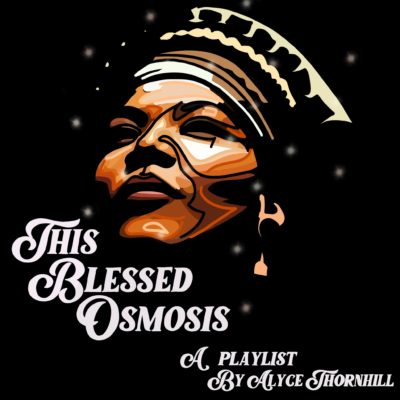
“Save the Children,” Gil Scott-Heron
“We’ve got to do something, yeah, to save the children/ Soon it will be their turns to try and save the world”
Gil Scott-Heron’s spoken-word lyrical style and blending of genres such as jazz and soul have established him by many as the “godfather” of hip-hop and rap. Adorned with melodic flute and deep electric bass, “Save the Children” is exemplary of Scott-Heron’s craft in blending jazz-funk and soul. Known for his politically conscious lyrics and perhaps his magnum opus, “The Revolution Will Not Be Televised,” Scott-Heron continues to be a giant on which genre and emerging artists stand upon.
“Hapi (with Benji. & EARTHGANG feat Mereba, Big Rube),” Spillage Village, Benji., EARTHGANG, Mereba
“This blessed osmosis, triggerin’ consciousness to focus/ And the paradigm ascension, transcendin’ beyond all space and time dimensions”
With a mouthful of features and associated artists, including rappers and producers, Spillage Village is an Atlanta collective creating music with heavy Southern soul and hip-hop influence. “Hapi” encompasses elements of gospel music with a hymn-like chorus and spiritual anecdotes, ending with a spoken-word piece by Big Rube.
“Everything is Everything,” Lauryn Hill
“I wrote these words (I wrote these words) for everyone who struggles in their youth/ Who won’t accept deception, in instead of what is truth (Gotta know the truth, y’all)”
A love letter to youth in America’s inner cities, “Everything is Everything” is one of many hip-hop/ neo-soul songs off of Ms.Lauryn Hill’s solo album “The Miseducation of Lauryn Hill.” As a third of Grammy-winning group Fugees and her through her solo career, Ms. Lauryn Hill established herself as a masterful MC and singer, known for her soulful voice, conscious lyrics and eloquent wordplay. She undoubtedly shaped the genres of soul and RnB for generations to come.
“Mad (feat. Lil Wayne),” Solange
“I ran into this girl, I said, ‘I’m tired of explaining’/ Man, this shit is draining/ But I’m not really allowed to be mad”
Featured on her album “Seat at the Table,” Texan R&B singer Solange comments on experiencing anger as a Black woman, a heavily stereotyped and racialized experience, in her song “Mad.” The pre chorus introduces us to a girl who is both dismissive and hypercritical of Solange’s frustration, which Solange and Lil Wayne both use to expand on the complexities of the Black experience in America.
“Mind Playing Tricks on Me,” Geto Boys
“Day by day it’s more impossible to cope/ I feel like I’m the one that’s doin’ dope”
A staple of Southern rap and the foundation of horrorcore hip-hop, Geto Boys’ “Mind Playing Tricks on Me” uses storytelling to explore feelings of paranoia and mental exhaustion. While the paranoia expressed in the song is attributed to a fear of being followed and targeted by gang members, Geto Boys’ work is also indicative of the greater trauma and PTSD experienced by many Black men as a result of state-sanctioned violence and daily attacks on Black men’s humanity. Scarface candidly speaking on his struggles with suicidal and anxious thoughts carved out a space for introspective lyricism in rap music.
“proud/pray,” Pink Siifu
“Lord gentrify, can’t recognise streets/ There to get by, die in their sleep/ Weed legalise but dealers ain’t free/ Behind cells they want me, I can tell they want me”
The music of Alabama-born rapper Pink Siifu encompasses themes of spirituality, love, trauma and revolutionary politics. “proud/pray” alludes to issues of police brutality and mass incarceration, with an attention to imagery that is both delicate and raw. His album “ensley” centers around messages of Black female empowerment, including “black woman is god,” “skin made of gold,” as well as recollections of his upbringing, as featured on tracks like “by any means necessary.” Atop choppy samples and lo-fi beats characteristic of other rappers in the experimental and underground rap scene, Siifu’s quiet but intricate poetic voice sets him apart as a rapper to watch.
“KISMET” Ivy Sole, lojii
“No compensation to replace a body breathing/ Not a currency alive or dead to substitute the feeling/ Of a day well spent/ Or an unkempt love”
“Kismet”: destiny; fate. Opening with a sample of a James Baldwin speech on history and education, Philadelphia rapper Ivy Sole explores ideas of Black futurity on their song “KISMET.” Filled with anecdote, feminist thought, spirituality and queerness, Sole’s lyricism fires quick. Sole’s bars are sharp-witted; with its roots in the Southern tradition but its eyes towards a future that looks vastly differently, their music is cutting, fresh and new.
“Keep Ya Head Up,” 2Pac
“And since a man can’t make one/ He has no right to tell a woman when and where to create one/ So will the real men get up?/ I know you’re fed up, ladies, but keep ya head up”
Tupac Shakur was never one to shy away from raps packed with political and social commentary, and “Keep Ya Head Up” is certainly one of his best. While he expresses frustration at issues such as domestic abuse, abortion access and misogyny, ultimately the song is testament to the strength of Black women, an expression of gratitude and love. Following in the footsteps of “Brenda’s Got a Baby” and preceding “Changes,” “Keep Ya Head Up” is full of all the things that make Shakur’s songs timeless anthems and exemplary of the West coast sound — smooth hooks, heavy bass, and charisma. His mother herself a Black Panther, Tupac addresses not only Black mothers but also the dreams of a more hopeful future: dedicating the song to both his godson and the daughter of Cheryl James (of Salt-N-Pepa).
“Tapestry of An Asteroid,” Sun Ra
Inspiring legends like John Coltrane and contemporary artists like D’Angelo and Solange, the influence of jazz giant Sun Ra transcends both genre and time and space. Incorporating elements of free jazz and spoken word, often found draped in capes donning interstellar symbolism, Ra himself was the embodiment of Afrofuturism: a musical style, an aesthetic, a spirituality and a political ideology centered around the African continent (from which he derived his Egyptian name). Having a significant political background — born in Birmingham, drafted into the second World War, and surrounded by radical Black thought — Sun Ra has made his mark as a “jazz revolutionary,” remaining a figure of mystery and immeasurable impact in music and beyond.
“Family,” Blood Orange
“You asked me what family is/ And I think of family as community/ I think of the spaces where you don’t have to shrink yourself/ Where you don’t have to pretend or to perform”
In this interlude off his fourth album “Charcoal Baby,” English singer, producer and director Dev Hynes, better known as Blood Orange, invites Janet Mock to speak on family. Mock is a transgender rights activist, writer and director, perhaps best known for her work on the Emmy-winning show “Pose.” Hynes’ album dives deep into queerness, Blackness, unrequited love and finding peace in un-belonging (“Charcoal Baby,” “Hope”) all wrapped up in silky vocals and dreamy synth chords. Mock’s spoken word is featured multiple times on the album, and in “Family,” she speaks to the notion of chosen families and finding home with people that accept you wholly, an affirmation of identity and belonging Hynes is able to capture in his work. A writer and producer for the likes of Mac Miller and Mariah Carey, as well as establishing himself as a composer for multiple films, Hynes is undeniable as a genre-bending artistic force.
“Thieves in the Night” Black Star
“Still living like mental slaves/ Hiding like thieves in the night from life/ Illusions of oasis making you look twice”
Composed of Brooklyn rappers Talib Kweli and Mos Def, both acclaimed artists in their own right, Black Star emerged in the 90s scene of socially conscious alternative rap. Black Star was an associated act the musical collective Native Tongues, spearheaded by A Tribe Called Quest, De La Soul and Jungle Brothers, known for their Afrocentric, uplifting messages and upbeat jazz-rap sound. Much of the chorus is directly quoted from Toni Morrison’s novel “The Bluest Eye,” which grapples with themes of race, gender, class and the psychological impact of anti-Blackness on the books protagonist, Pecola Breedlove. Aside from their intricate use of internal rhyme and deep political messaging — touching on everything from the wounds of slavery and postracialism to the exploitation of Black arists by record companies — their catchy back-and-forth, as well as their light melodies, create a piece of music that is both pedadogic and playful.
“It’s A Shame (My Sister)” Monie Love, True Image
“Get back on your feet please/ I’m beggin you to check out all your own needs/ Don’t let nobody see you in a state of grievin, over the brother/ There’s another possibility”
British rapper Monie Love was another notable member of the collective Native Tongues, often identified as the protégé of Queen Latifah, though she herself is a two-time Grammy-nominated artist. Like other artists of the jazz rap era, Monie Love was known for her conscious lyrics, specifically relating to themes of autonomy and female empowerment. “It’s A Shame” encompasses the vibrant, uncontainable energy of early 90s anthems, the stuff which hits from Latifah, TLC and Salt-N-Pepa are made of. Dipped in the unshakably catchy tune of The Spinner’s original rendition, Monie Love intimately addresses her young, female audience — “My sister, my sister, tell me what the trouble is” — urging young women to protect their feelings and let go of any relationships that fail to value their worth.
“Self” Noname
“My pussy teachin ninth-grade English/ My pussy wrote a thesis on colonialism/ In conversation with a marginal system in love with Jesus”
Growing up in her mother’s bookstore in Chicago, Fatimah Warner, better known as Noname, began as a slam poet before freestyling with fellow Chicagoans-turned-collaborators Saba, Smino and Chance the Rapper. Her stunning debut mixtape, Telefone, proved her a powerful storyteller, recounting conversations and relationships through a soothing and soulful “lullaby rap.” A master of delivery and flow, Noname’s bars fire as both politics and poetry, as she is also known for her radical politics and book club focused on community building and uplifting. The first song on her most recent album, Room 25, “Self” is an unapologetic declaration of both sexuality and scholarship, bound up in clever wordplay and words so fast they risk flying right over your head: “Y’all really thought a bitch couldn’t rap, huh?”
“People Get Ready” Aretha Franklin
“So people get ready, there’s a train coming/ You don’t need no ticket, we’ll just get on board”
No playlist would be complete without the undeniable force that is Aretha Franklin. Like many of her other hits, “Think,” “Respect” and “Young Gifted and Black,” Franklin’s music, full of familiar elements of the gospel genre, is the heart and soul of protest, specifically during the Black Freedom Struggle of the 60s. Originally written by Curtis Mayfield, “People Get Ready” is not only a spiritual hymn but also a call to action, built around the motif of trains, of physical and spiritual movement, departing from one place onto the next. Franklin’s range and power has forever designated her voice as the embodiment of soul, a voice that commands to be heard and harnesses both hope and power.
“Mercy Mercy Me (The Ecology)” Marvin Gaye
Like “What’s Going On?” and “Inner City Blues,” Gaye’s “Mercy Mercy Me” is a song of lamentation, an expression of disbelief at the state of the world, specifically the destruction of the planet. With his incredible musical range, in the warmth of his voice Gaye is able to capture sensuality, soul and sorrow; emotion that transcends lyrics and is found in his distinct motown sound. “Mercy Mercy Me” contains a flurry of strings and chimes, and a saxophone solo that speaks perhaps more than Gaye himself. While many of his songs of protest were written at crucial points in history — the Vietnam War, segregation, the environmentalism movement of the 70s — they remain harmonious and provocative with the present.

